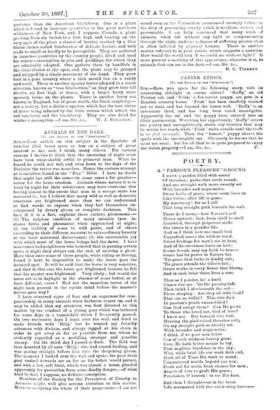THE AMERICAN BLACKBERRY.
[To THZ EDTTOR OF THE "SPECTATOR."] SIR,—In your article on " Wild Fruits of Autumn" in the Spectator of October 9th an allusion is made to the American blackberry, and the advisability of introducing it into England. If the plant would produce the same fruit in England that it does in America it would become an important addition to English fruits, but having made the attempt to acclimatise it in the Isle of Wight, I do not believe it can succeed elsewhere in England ; for there its fruit was in no way superior to that of the native species, for it is a distinct species, as different from the ordinary English berry as is the dewberry. Amongst the varieties, rather species, of whortleberry found in America there are some which, if successfully acclimatised, would be of more im, portance than the American blackberry. One is a plant which is found in immense quantities in the great northern wilderness of New York, and, I suppose, Canada, a plant growing from six inches to a foot high and bearing on the -very apex of the plant a cluster of berries, marked by a blue bloom (hence called blueberries) of delicate flavour, and with seeds so small as hardly to be perceptible. They are gathered in immense quantities by the country people, dried and used for winter consumption in pies and puddings, for which they are admirably adapted. One gathers them by handfuls in the close cluster at the apex, and the plant may be grasped and stripped by a single movement of the hand. They grow best in a pine country where a thin mould lies on a sandy undersoil. There is another species better adapted to a moist situation, known as " tree blueberries," as they grow into tall shrubs, six feet high at times, with a larger berry more sparsely borne on the plants. There is another berry not known in England, but of great worth, the black raspberry,— not a variety, but a distinct species, which has the rare virtue of never being infested by the little worms which attack the red raspberry and the blackberry. They are also dried for
winter consumption.—I am, Sir, &c., W. J. STILLMAN.







































 Previous page
Previous page